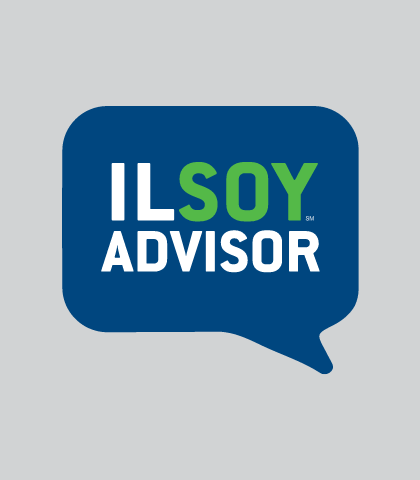Shelby Stoner recaps her summer 2023 internship with the Illinois Soybean Association (ISA) Agronomy Team in this Q&A session.
What was your favorite thing about your internship?
- I enjoyed working with all the great people at Illinois Soybean Association, especially the agronomy team.
- The agronomy team supported my ideas, and I enjoyed having a lot of creative freedom during my internship.
- I appreciated how well everyone answered all my questions and provided me with the answers if unknown at the time.
- I used prior knowledge I had and then researched new information to create “Field Notes” or blogs for the ILSoyAdvisor.com to help inform readers about current events in the agronomy world.
What were some of the events that you attended during your summer 2023 internship?
- Wheat Tour, Teutopolis, IL
- I spent the day in southern Illinois assessing wheat yields. I learned how to determine a population from a sample of wheat as well as calculate wheat yield.
- UIUC Wheat Field Day, Urbana, IL
- I took a tour of the wheat breeding plots at the University of Illinois farm. This tour included a view of the wheat nursery and various variety trial plots that included wheat, oats, barley, and rye. I was able to see a variety of triticale which is a plant that I had never seen before. Triticale is a cross between wheat and rye and used as a cereal grain that is used for animal feed.
- ISA Ideus Field Talk, St. Joseph, IL
- I listened to speakers on various topics such as:
- Stephanie Porter gave a talk about current soybean issues and nutrient needs in relation to soybean growth stages. She also brought a few soybean plants that had chlorosis on the outer leaf edges, a common symptom of potassium deficiency due to drought.
- Abigail Peterson gave a talk about conservation opportunities ISA offers for soil health improvement. She also showed some visuals that included a side–by–side comparison of a field that had soil management practices versus a field that used conventional practices.
- Frank Rademacher gave a talk about how to incorporate conservation practices into farm operations. In his talk, he mentioned various cover crop species and the benefits they can bring when practicing conservation tillage. He is a farmer himself and explained a few of the challenges and successes he has had on his own farm.
- Dr. Nick Seiter gave a talk about recent research findings and opened his talk to the audience so that they could ask questions and did a question–and–answer type of discussion. A few topics that came up included corn rootworm beetles and spider mites in soybeans.
- I listened to speakers on various topics such as:
- UIUC Weeds Field Day, Urbana, IL
- I looked at different herbicide trials that the University of Illinois is evaluating. There was a wide variety of different corn and soybean trials in which various herbicide applications were applied. It was very interesting to see how the different combinations of herbicide applications did or did not protect against weeds.
- Soybean Research Forum Think Tank, Indianapolis, IN
- Throughout the three days of the conference, we heard from multiple speakers about traceability and transparency within the agriculture industry, and more specifically in soybean production. My goal during this event was to learn something new, bring back new information, and to find the gaps where further research is needed. Attendees of this conference were placed at tables based on numbers given the first day. At the tables, there were mediators that recorded notes on the talks as well as guided discussion from planned questions. Each table, or group, would discuss the speakers’ talk and answer the questions that were provided. The table discussions were then pooled together with the other tables and analyzed to determine different research needs. Valuable information was also gathered from the table discussions. The Think Tank was a very interesting event and I learned a lot.
What was your specific focus throughout your internship?
- One of my big projects this summer was to form a collection of weeds and insects for the agronomy team to display at field events, Farm Progress Show, and other events they may hold in the future. This is an educational tool that can be helpful for demonstration purposes. Weed collection is a very lengthy process that can be done during spring, summer, and fall as there are a variety of different weeds that sprout throughout the seasons. There are a couple steps involved in the collection process including actual collection, dry down, lamination, and labeling. By the time my internship concludes, I will have collected about 50 different weeds and 20 insects. This project has taught me patience, but it was worth it in the end to see my work put into a beautiful display.
What happens next after this internship?
- I am very excited to be pursuing my master’s degree at Illinois State University in Agriscience with a focus in agronomy. I will be doing a two-year research project working with anerobic digestion with cover crop mass.








 and then
and then